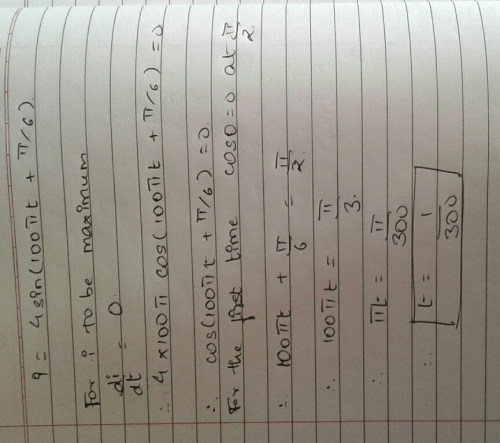Class 12 Exam > Class 12 Questions > An ac circuit, the current is given by i = 4 ...
Start Learning for Free
An ac circuit, the current is given by i = 4 sin (100pt + 30º) ampere. The current becomes maximum first time (after t = 0) at t equal to
- a)(1/200) sec
- b)(1/300) sec
- c)(1/50) sec
- d)None of the above
Correct answer is option 'B'. Can you explain this answer?
Most Upvoted Answer
An ac circuit, the current is given by i = 4 sin (100pt + 30º) am...
i=4sin(100πt+ π/6)
For I to be maximum
di/dt=0
therefore,4x100π(cos(100πt+π/6)=0
therefore, ωs(100πt+ π/6)=0
for the first time cosθ=0 at π/2
⇒ 100πt+ π/6= π/2
⇒ 100πt= π/3
⇒ πt= π/300
T=1/300
For I to be maximum
di/dt=0
therefore,4x100π(cos(100πt+π/6)=0
therefore, ωs(100πt+ π/6)=0
for the first time cosθ=0 at π/2
⇒ 100πt+ π/6= π/2
⇒ 100πt= π/3
⇒ πt= π/300
T=1/300
Free Test
FREE
| Start Free Test |
Community Answer
An ac circuit, the current is given by i = 4 sin (100pt + 30º) am...


|
Explore Courses for Class 12 exam
|

|
Question Description
An ac circuit, the current is given by i = 4 sin (100pt + 30º) ampere. The current becomes maximum first time (after t = 0) at t equal toa)(1/200) secb)(1/300) secc)(1/50) secd)None of the aboveCorrect answer is option 'B'. Can you explain this answer? for Class 12 2025 is part of Class 12 preparation. The Question and answers have been prepared according to the Class 12 exam syllabus. Information about An ac circuit, the current is given by i = 4 sin (100pt + 30º) ampere. The current becomes maximum first time (after t = 0) at t equal toa)(1/200) secb)(1/300) secc)(1/50) secd)None of the aboveCorrect answer is option 'B'. Can you explain this answer? covers all topics & solutions for Class 12 2025 Exam. Find important definitions, questions, meanings, examples, exercises and tests below for An ac circuit, the current is given by i = 4 sin (100pt + 30º) ampere. The current becomes maximum first time (after t = 0) at t equal toa)(1/200) secb)(1/300) secc)(1/50) secd)None of the aboveCorrect answer is option 'B'. Can you explain this answer?.
An ac circuit, the current is given by i = 4 sin (100pt + 30º) ampere. The current becomes maximum first time (after t = 0) at t equal toa)(1/200) secb)(1/300) secc)(1/50) secd)None of the aboveCorrect answer is option 'B'. Can you explain this answer? for Class 12 2025 is part of Class 12 preparation. The Question and answers have been prepared according to the Class 12 exam syllabus. Information about An ac circuit, the current is given by i = 4 sin (100pt + 30º) ampere. The current becomes maximum first time (after t = 0) at t equal toa)(1/200) secb)(1/300) secc)(1/50) secd)None of the aboveCorrect answer is option 'B'. Can you explain this answer? covers all topics & solutions for Class 12 2025 Exam. Find important definitions, questions, meanings, examples, exercises and tests below for An ac circuit, the current is given by i = 4 sin (100pt + 30º) ampere. The current becomes maximum first time (after t = 0) at t equal toa)(1/200) secb)(1/300) secc)(1/50) secd)None of the aboveCorrect answer is option 'B'. Can you explain this answer?.
Solutions for An ac circuit, the current is given by i = 4 sin (100pt + 30º) ampere. The current becomes maximum first time (after t = 0) at t equal toa)(1/200) secb)(1/300) secc)(1/50) secd)None of the aboveCorrect answer is option 'B'. Can you explain this answer? in English & in Hindi are available as part of our courses for Class 12.
Download more important topics, notes, lectures and mock test series for Class 12 Exam by signing up for free.
Here you can find the meaning of An ac circuit, the current is given by i = 4 sin (100pt + 30º) ampere. The current becomes maximum first time (after t = 0) at t equal toa)(1/200) secb)(1/300) secc)(1/50) secd)None of the aboveCorrect answer is option 'B'. Can you explain this answer? defined & explained in the simplest way possible. Besides giving the explanation of
An ac circuit, the current is given by i = 4 sin (100pt + 30º) ampere. The current becomes maximum first time (after t = 0) at t equal toa)(1/200) secb)(1/300) secc)(1/50) secd)None of the aboveCorrect answer is option 'B'. Can you explain this answer?, a detailed solution for An ac circuit, the current is given by i = 4 sin (100pt + 30º) ampere. The current becomes maximum first time (after t = 0) at t equal toa)(1/200) secb)(1/300) secc)(1/50) secd)None of the aboveCorrect answer is option 'B'. Can you explain this answer? has been provided alongside types of An ac circuit, the current is given by i = 4 sin (100pt + 30º) ampere. The current becomes maximum first time (after t = 0) at t equal toa)(1/200) secb)(1/300) secc)(1/50) secd)None of the aboveCorrect answer is option 'B'. Can you explain this answer? theory, EduRev gives you an
ample number of questions to practice An ac circuit, the current is given by i = 4 sin (100pt + 30º) ampere. The current becomes maximum first time (after t = 0) at t equal toa)(1/200) secb)(1/300) secc)(1/50) secd)None of the aboveCorrect answer is option 'B'. Can you explain this answer? tests, examples and also practice Class 12 tests.

|
Explore Courses for Class 12 exam
|

|
Signup for Free!
Signup to see your scores go up within 7 days! Learn & Practice with 1000+ FREE Notes, Videos & Tests.



















